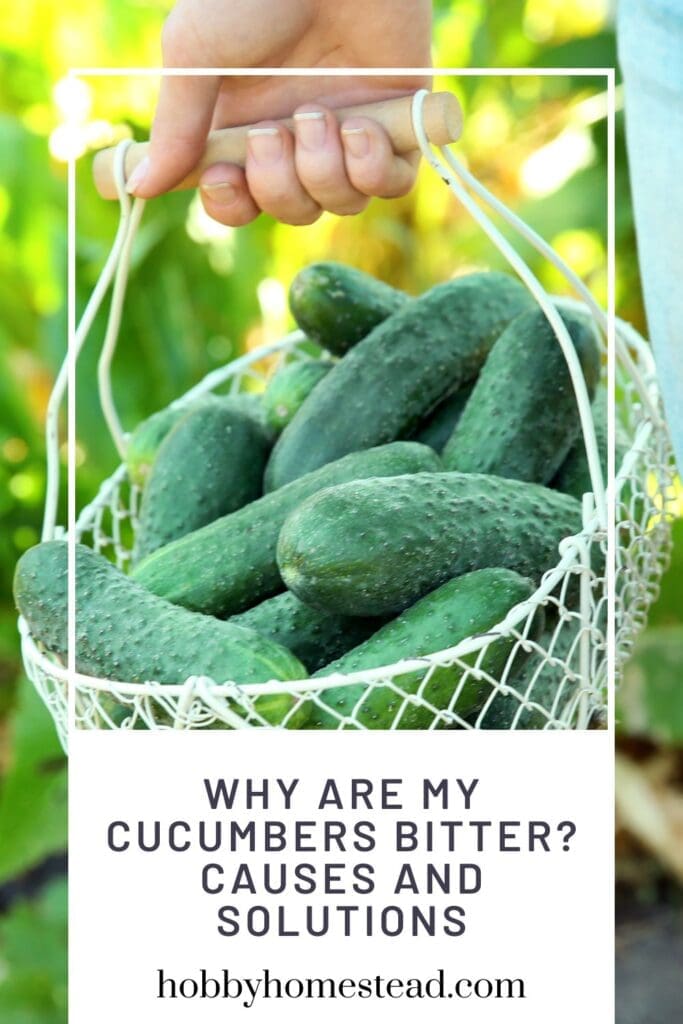Last updated on April 25th, 2025 at 09:58 am
Why Are My Cucumbers Bitter? There’s nothing more disappointing than harvesting what should be a crisp, refreshing cucumber—only to discover it has a bitter flavor. Bitter cucumbers are a common issue among gardeners, leaving many wondering what went wrong.
Cucumbers are one of the most popular vegetables to grow in a home garden, second only to tomatoes. And it’s easy to see why. They produce abundantly and are versatile in the kitchen.
Making them perfect for pickling, slicing into a tasty green salad, layering on sandwiches, or even dehydrating into chips. Whether you’re growing lemon cucumbers, bitter-free cultivars, or classic regular cucumbers, a well-cared-for plant can yield an abundant harvest.

While they are relatively easy to grow, they do come with challenges. Cucumber beetles, powdery mildew, and other fungal diseases can threaten your plants. But one of the most frustrating reasons for disappointment is biting into a bitter cucumber fruit. A bitter taste can make an otherwise delicious crop nearly inedible.
Bitterness is often caused by environmental stress, watering habits, or certain cucumber varieties. The good news is that you can take steps to prevent bitter-tasting cucumbers and enjoy sweet cucumbers straight from your own garden.
Let’s find some practical solutions to ensure every sweet slice is delicious and refreshing.
Main Reasons Cucumbers Taste Bitter
Cucurbitacin Buildup: A Natural Defense Mechanism
Cucumbers are a member of the cucurbit family, which includes squash, melons, and pumpkins. They contain cucurbitacin B, a bitter compound that acts as a defense mechanism against pests.
While bitter-free varieties have been bred to have lower levels of cucurbitacin, stress can still cause bitterness to develop, especially in older varieties.
The amount of cucurbitacin is often concentrated at the stem end of the cucumber and the blossom end of the fruit. If your bitter cucumber fruit only has a mild bitterness, peeling the entire fruit and removing the stem end of the fruit can help.

Environmental Stressors That Lead to Bitter Cucumbers
Several environmental factors can increase the bitter cucumber taste, including.
Poor Watering Habits
Lack of water or long periods of drought can stress the root system, leading to a higher concentration of bitter compounds in the fruit of the plant.
Deep watering with a soaker hose helps maintain soil moisture and prevents dry conditions that contribute to bitterness.
Even temperature control is important—avoid extreme swings between wet and dry soil.
High Heat and Extreme Temperature Fluctuations
Excessive heat, especially in the growing season, can trigger bitterness in cucumber varieties that are sensitive to stress.
In overcast areas like the Pacific Northwest, cucumbers may struggle with a lack of sun, while in hotter regions, heat stress and extreme temperature fluctuations are the most frustrating reason for bitter cucumber fruits.
Using shade cloth during high heat periods can help protect plants.
Nutrient Deficiencies and Soil Health
Cucumbers are heavy feeders and need enough nutrients to produce sweet cucumbers.
Amending soil with organic compost and organic matter improves nutrient availability.
Poor watering combined with low nutrients can result in bitter-tasting cukes.
Pests and Diseases
Cucumber beetles and powdery mildew can stress the base of plants, leading to bitterness.
Fungal diseases can weaken the roots of cucumber plants, making them more susceptible to stress.
Companion planting with marigolds, basil, or nasturtiums can help deter pests.

Best Way to Prevent Bitter Cucumbers
If you’ve struggled with bitter food from your home garden, here are the best ways to grow bitter-free cultivars.
1. Choose the Right Varieties
Opt for bitter-free varieties like Sweet Success, Garden Sweet, and Lemon Cucumbers to reduce bitterness.
Regular cucumbers and some county fair winners have been bred for lower levels of cucurbitacin.
2. Maintain Proper Watering and Soil Moisture
Use deep watering techniques to keep roots hydrated.
Water regularly, especially during dry weather or periods of drought.
A soaker hose is the only way to ensure even moisture without overwatering.
3. Harvest at the Right Time
Overripe cucumbers are more likely to be bitter.
Pick cucumbers when they are small to medium-sized before the bitter compounds develop.
4. Provide Shade in Extreme Heat
Use shade cloth during excessive heat to reduce heat stress.
Protect plants during long hot spells to avoid bitter cucumber fruit.
5. Prevent Pests and Diseases
Rotate crops and use companion planting to reduce pest pressure.
Avoid planting cucumbers near others in the gourd family to prevent disease spread.
How to Fix Bitter-Tasting Cucumbers
If you’ve already harvested bitter cukes, try these tricks to remove the bitter cucumber taste.
Peel the Skin. Most bitterness is concentrated in the skin and stem end of the plant.
Cut Off the Ends. The stem end of the cucumber contains the highest concentration of cucurbitacin compounds.
Salt and Soak. Sprinkling slices with salt and letting them sit for 10 minutes can help reduce the bitter flavor.
Pair with Sweeter Ingredients. Adding bitter cucumbers to a cucumber salad with lemon juice, yogurt, or honey can help balance the taste.
Growing sweet cucumbers instead of bitter-tasting cucumbers comes down to selecting the right varieties, maintaining soil moisture, and avoiding environmental stressors like dry weather, high heat, and poor watering.
By following these tips, you’ll enjoy more tasty green cucumbers from your own garden without worrying about that bitter cucumber taste.


